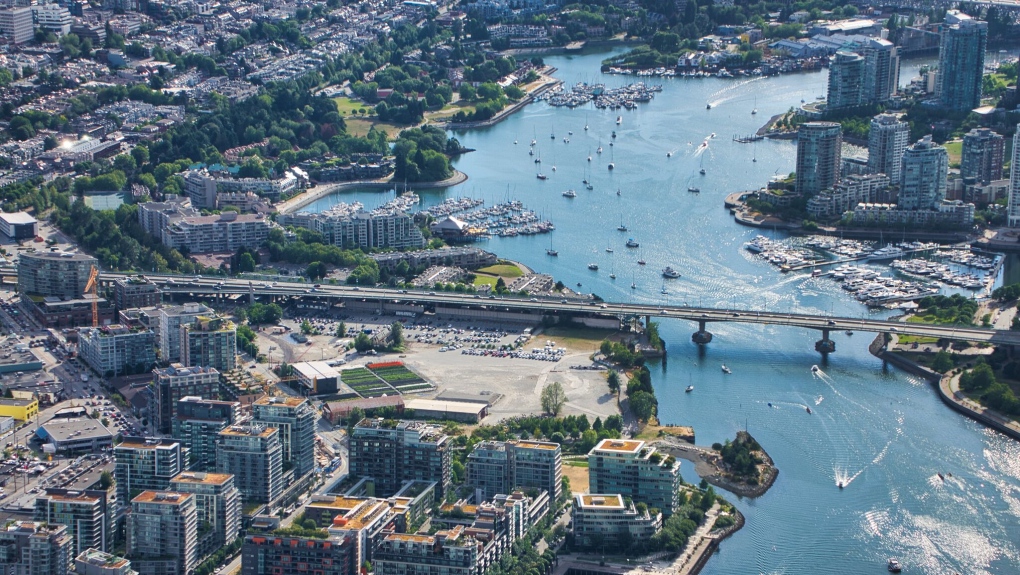Owners of empty homes will pay more in Vancouver
 False Creek and the Cambie Street Bridge are seen from Chopper 9 above Vancouver in June 2019. (Pete Cline / CTV News Vancouver)
False Creek and the Cambie Street Bridge are seen from Chopper 9 above Vancouver in June 2019. (Pete Cline / CTV News Vancouver)
It will soon cost more to be the owner of an empty residential property in Vancouver, as a motion for another tax hike is approved.
The city's Empty Homes Tax – charged to owners who don't live in or rent out their properties – is going up to five per cent next year.
Previously these owners had to pay an extra three per cent in taxes as part of the measure meant to encourage the long-term rental of empty homes.
The measure, put in place years ago, was in response to a near-zero vacancy rate in Vancouver that led to sky-high rents for the limited housing supply. Since imposed, the available supply has improved, though landlords continue to ask for more rent each year.
The move was also to discourage homeowners from using their properties solely for the arguably more profitable short-term rental system, through sites like Airbnb. Those who do want to rent on those sites can still do so, but need a business licence and can only rent their space if it's the owner's principal residence, or a secondary suite in which the operator lives most of the time.
The motion to increase the tax again was put forward by Mayor Kennedy Stewart, and included too that the number of audits be more than doubled – to 20,000 for 2023, up from 9,000.
The approved proposal also directed city staff to report back to council early next year on how the tax can be used to reduce the "large number of short-term rental properties," how exemptions can be altered to ensure fairness, and how it will be impacted by recently approved federal measures.
Additionally, the mayor asked staff to look at how a doubled rate of 10 per cent might impact the city's rental market. As for whether that tax hike is actually a possibility, 2022 is a municipal election year, so it may depend as much on who is leading the city after the vote as the results of the research by staffers.
CTVNews.ca Top Stories

A father at the bedside of his son and a woman who stayed behind with her beloved pets are among California wildfire victims
An amputee and his son with cerebral palsy were among the 11 deaths in the fires raging around Los Angeles. The father was found at his son’s bedside.
Former B.C. premier says she 'misspoke' when claiming she was never a Conservative
Former British Columbia premier Christy Clark, who is considering a run for federal Liberal leader, has backtracked on her claim this week that she'd never been a member of the Conservative party.
UPDATED Anita Anand will not seek Liberal leadership
Transport Minister Anita Anand announced on social media Saturday she will not seek the leadership of the Liberal Party, nor will she run for re-election in the riding of Oakville.
'It's not realistic': Former PM Chretien thinks Trump will back off trade war
Former prime minister Jean Chretien says U.S. president-elect Donald Trump is likely to walk back his threat of punishing tariffs and the resulting trade war with Canada, because the Americans are too reliant on a number of Canadian exports, namely in the energy sector.
This Canadian teen lost her hands and feet, she says more people should know how it happened
A Canadian teen is reaching audiences around the world with powerful social media videos showing life without hands and feet – the price she paid after developing sepsis.
Heroes in action: Strangers lift car to rescue a woman pinned underneath
A group of good Samaritans teamed up with law enforcement this week to save an elderly woman pinned underneath her car in Lawerence, Mass.
Vancouver strip club's X account suspended over cheeky marquee message
The marquee at The Penthouse strip club in downtown Vancouver is known for its edgy comments on politics and pop culture.
'I'll never call him dad again:' Gisele Pelicot’s daughter says she suspects her father also drugged her for sexual abuse
Caroline Darian, the daughter of Gisele Pelicot who sustained years of horrific sexual abuse by her then-husband and other men, has described how she’s certain her father drugged her and strongly suspects she was raped too.
Tough lesson: Thousands of 'unqualified' teachers in Quebec schools
Monique Henry has been teaching English in Quebec for the better part of two decades without official certification. As a so-called "unqualified" teacher, she has had to learn her profession the hard way.

































